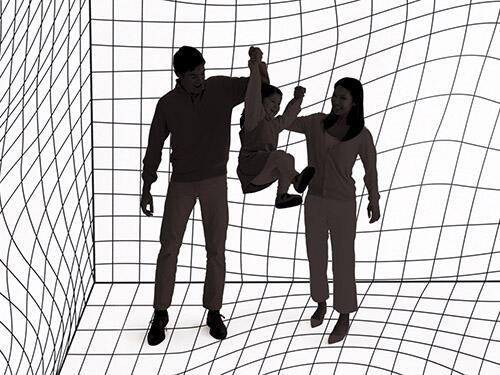Our Senses: An Immersive Experience
November 20, 2017 — January 1, 2019

In this highly experiential exhibition, explore 11 funhouse-like spaces that dare you to trust your senses—then show you how what we perceive is not simply a window into the world around us but a product of our brains. Plus, discover why we have senses and what’s unique about human perception during an interactive session hosted by a live presenter.
©AMNH/R. Mickens
©AMNH/C. Chesek
©AMNH/R. Mickens
©AMNH/R. Mickens
©AMNH/C. Chesek
©AMNH/R. Mickens
OUR SENSES: AN IMMERSIVE EXPERIENCE
Published October 20, 2017
[A nose sniffs the air.]
[SNIFF, SNIFF]
[A tongue runs over lips.]
[LIP SMACK]
[An eye blinks.]
[PING]
[A laughing child is swung around in a circle by the arms]
[GIGGLING]
ROB DESALLE (Curator, Division of Invertebrate Zoology): In order to understand our senses,
[Close up on two people holding hands. Close up of a man wiggling his ear.]
DESALLE: ...we have to keep in mind that the way we look at the world,
[A frog blinks. An octopus' tentacles move across a tank.]
DESALLE: ...the way we take in things from the world...
[A green insect moves its mouthparts. An echidna sniffs through leaves close to the camera.]
DESALLE: ...is through organs and through structures that evolved.
[Curator Rob DeSalle speaks in his office.]
DESALLE: This makes it a very natural history kind of an exhibition.
[Title of exhibit—OUR SENSES: AN IMMERSIVE EXPERIENCE—appears over kaleidoscopic dots in motion.]
[Red, green, and blue circles move over animal illustration overprinting magenta, cyan, and yellow layers. When the red circle moves over the illustration, only the cyan layer is visible. As the green circle moves, only the magenta layer is visible. Under the blue circle, only the yellow layer is visible.]
DESALLE: What we want to try to do is immerse you into situations—
[Sight lines project out from illustration of human eye.]
DESALLE: ...how your senses work,
[Images of a human eye, a butterfly, and a bee.]
DESALLE: ...and how those senses might work in other organisms.
[The human, butterfly, and bee are replaced by images of the same coneflower, as it would appear through a human eye, a butterfly eye, and a bee eye. All show different coloration.]
[Time lapse telescopes scan the night sky in the upper left corner of the frame.]
DESALLE: Think about what's coming in—light is coming in,
[A mother skunk and her baby appear in the lower left corner of the frame.]
DESALLE: ...chemicals are coming in,
[A woman playing the violin appears in the upper right corner of the frame.]
DESALLE: sound,
[Footage showing the point of view of people on a roller coaster appears in the bottom right corner of the frame.]
DESALLE: ...information about where you are in space. So, all of this information's coming in,
[Dotted lines are drawn out from an illustration of a human brain, connecting to circles containing images of different sensory structures.]
DESALLE: ...and we have evolved these mechanisms—they're machines, really—that collect this information.
[DeSalle speaks in his office.]
DESALLE: Our senses get integrated together...
[A camper van sits on the horizon beneath a timelapse of stars moving across the sky.]
[CRICKETS CHIRP, CHILDREN LAUGH]
DESALLE: ...to give us this overall picture of the world that's around us.
[MUSIC PLAYS]
[Credits roll.]
Engage Your Senses
Seeing
Now you see me, now you don’t: what you see depends on the LIGHT. The same scene can be perceived in many ways.
Detecting
Explore how the colors you see, and the sounds you hear, are different from what other species sense. There's no one "right" way to see the world.
Hearing
You hear with the help of some 15,000 cells arranged in rows deep inside your ears—and listen thanks to your brain’s selective filter. Discover the difference between what helps you hear, and what makes you listen.
Selecting
Your senses flood your brain with information—how can you pay attention to it all? Find out what helps you focus—and why our eyes and ears jump to certain things.
Balancing
To balance, your brain performs its own balancing act with the information you see, feel, and sense with the organs in your inner ears. Find out what happens when these streams of information clash.
Correcting
Perceptions don’t just come from your eyes and ears. They also come from your brain. Explore how your brain pieces together scraps of information from your sensory organs, and then fills in the gaps from memory.
Touch
Your sense of touch isn’t one—it’s many, with nerve endings to feel hot, cold, extreme temperatures, pressures, textures, pain, even itch. Find out how complex your touch system really is.
Smell
Decoding mixes of molecules is what your nose is doing all day—and your brain is linking aromas to memories to help you recognize familiar scents.
Beyond Our Senses
Humans have an advantage: we can extend our senses with technology, using tools to detect things our bodies cannot sense. Find out how we’re using technology to detect and interpret the universe around us.
Our Senses is generously supported by Dana and Virginia Randt.